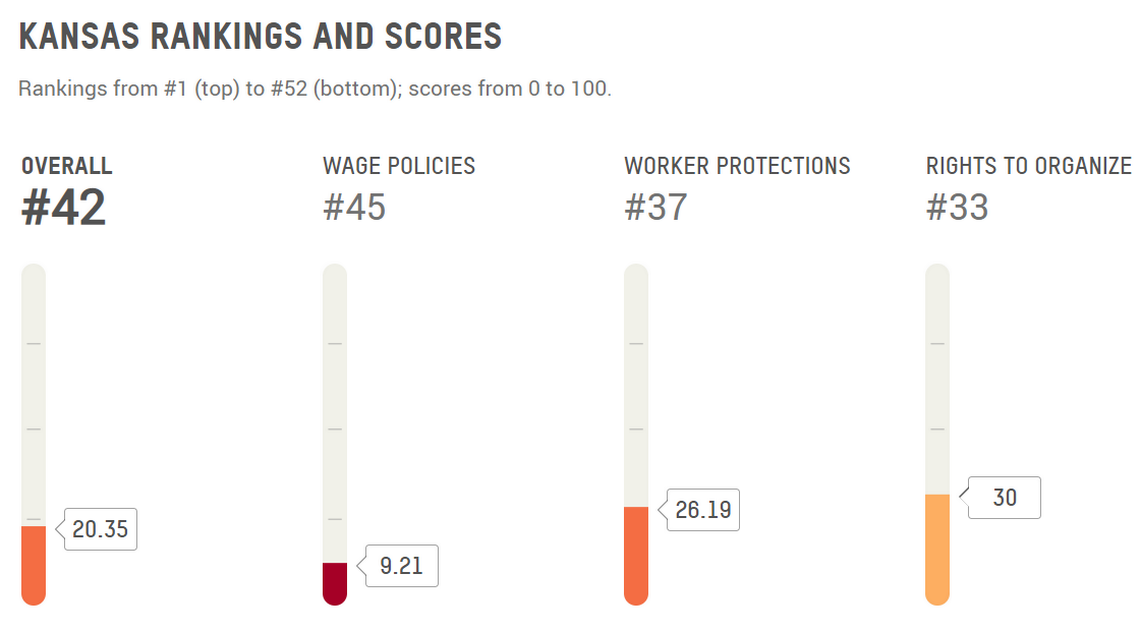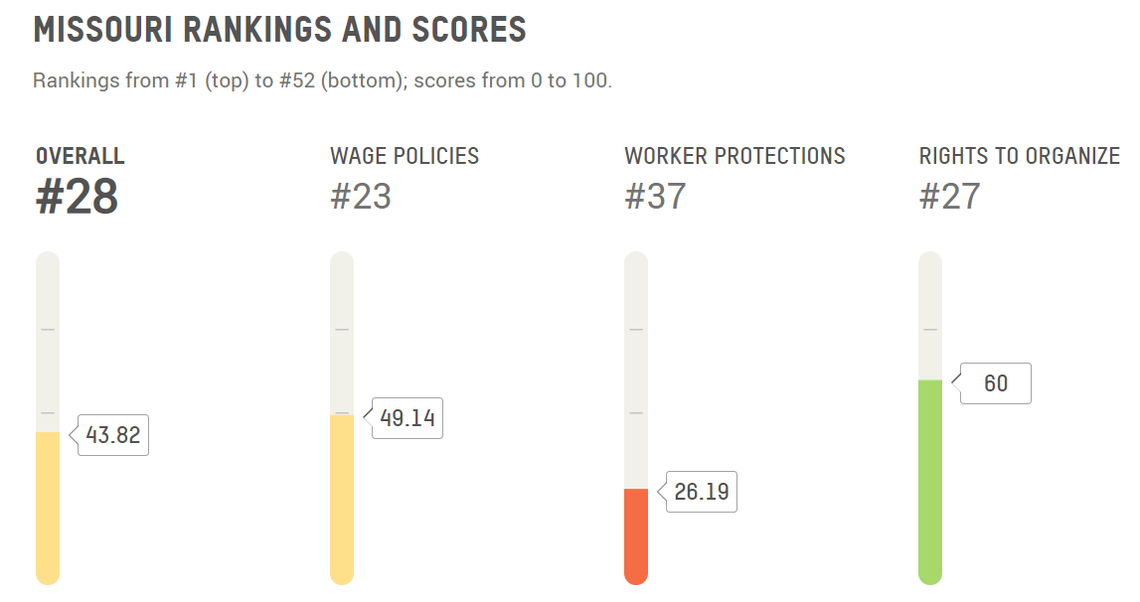Kansas ranked among the worst places to work in the U.S. How does Missouri compare?
The anti-poverty nonprofit Oxfam has released new rankings measuring which states are the best for workers in the U.S. — and Kansas and Missouri didn’t fare too well.
Kansas ranks 42nd in the nation for pro-worker policies, while Missouri ranks 28th, the report concludes. The rankings combine scores on state-level wage policies, worker protections and the right to organize.
Here’s a closer look at the state policies that affect workers in Missouri and Kansas.
What policies govern wages in Missouri and Kansas?
Kansas ranks extremely low on wage policies, coming in at 45th out of 50 states, plus Puerto Rico and Washington, D.C. Kansas’ tipped minimum wage is just $2.13 per hour, and its full minimum wage is at the federal minimum of $7.25 per hour.
Kansas’ minimum wage covers less than 20% of the cost of living for an average family of four, the report finds. According to the MIT Living Wage Calculator, even a single adult with no children must make at least $20.35 per hour to cover basic necessities in Kansas — far higher than the current minimum wage.

Missouri ranks a little better on wage policies due to its statewide minimum wage of $12.30, enough to cover around a third of the cost of living for a family of four. The state is ranked 23rd in the nation on wage policies, putting it slightly above the midpoint.
Minimum wage will be on the Missouri ballot this November after the state approved a citizen-led signature petition last month. If passed, the measure would raise Missouri’s minimum wage to $15 per hour by 2026 and would allow all employees to accrue paid sick time based on their hours worked.
The living wage in Missouri for a childless adult is $20.20 per hour — and for an adult to support a family of four, it’s $38.24 per hour.
Both states prohibit localities from setting their own minimum wages above the state standard — and both have minimum wages that fall far below the typical cost of living. That makes it difficult to afford the cost of living in the states’ more expensive areas, including in and around Kansas City.
What protections do workers have in Missouri and Kansas?
Oxfam ranked states based on 16 criteria for worker protections that are enshrined in state laws. They included paid family and sick leave policies, regulations around shift scheduling, heat protections for outdoor workers, and equal protections for farm and domestic workers, who are often excluded from labor laws.
Kansas and Missouri each only met three of the 16 total criteria, landing them in a tie for 37th place on the overall ranking for worker protections.

The two states have the same three types of listed protections: They mandate equal pay across race and gender, provide some form of sexual harassment protection in state laws and regulate child labor.
However, the rankings don’t rate the effectiveness of these legal protections, leaving their impact on workers up to interpretation. The ranking merely records whether some protections exist on the books — not how robust they are or how well they’re enforced.
What organizing rights do workers have in Missouri and Kansas?
Both Kansas and Missouri landed in the bottom half of Oxfam’s rankings for labor organizing rights.
Kansas ranks 33rd out of 52 jurisdictions for organizing rights. While it provides collective bargaining rights to teachers and some other public workers, it does not protect workers from retaliation for wage theft or ensure fair wages to contracted workers.
Perhaps most importantly, Kansas is a “right-to-work” state, meaning employees can’t be compelled to pay union dues even if a union represents and protects their interests in the workplace. Kansas is one of 26 states with these laws, which are generally seen as hurting labor unions.
Missouri ranks slightly higher on organizing rights for workers. Voters overturned the state’s right-to-work law in 2018 in a resounding defeat that gives labor unions authority to collect some dues from those it represents. It also requires collective bargaining for public workers, something Kansas law does not fully require. These measures land the state in 27th place out of 52 jurisdictions.
Do you have more questions about wages or labor rights in Missouri or Kansas? Ask the Service Journalism team at kcq@kcstar.com.






